1967
■ Proskauer Rose’s David Stern begins his association with the league as an outside counsel.
1976
{podcast}
SBJ Podcast:
NBA writer John Lombardo and Executive Editor Abraham Madkour discuss David Stern's impact
on the NBA and what his future might hold.
Stern works on the landmark Oscar Robertson antitrust settlement, which paves the way for free agency.
■ Stern helps represent the NBA during the ABA-NBA merger.
1978
■ Stern leaves Proskauer Rose and becomes the NBA’s first general counsel.
1980
■ Stern is promoted to the newly created position of NBA executive vice president.
1983
■ The NBA and the NBPA agree to a new four-year labor agreement that gives players 53 percent of gross revenue starting with the 1984-85 season. The two sides also establish a program to battle drug abuse, providing rehabilitation and requiring expulsion of repeat offenders and players convicted of using or selling drugs.
1984
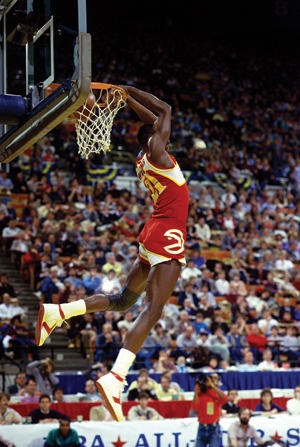 |
Dominique Wilkins shows his skills at the 1984 slam dunk contest.
Photo by: NBAE / Getty Images |
■ Stern named commissioner, succeeding Larry O’Brien.
■ The league makes the All-Star Game a weekend affair by adding the Gatorade Slam-Dunk Contest and Schick/American Airlines Old-Timers Game to the festivities.
■ The league signs a two-year, $20 million broadcast deal with TBS for cable broadcasting rights.
■ The Clippers relocate to Los Angeles from San Diego.
■ The Chicago Bulls use the third overall pick of the draft to select future hall of famer Michael Jordan.
■ Before the season, a $3.6 million salary cap is set in place, the league’s first cap since the 1940s.
1985
■ The Kansas City Kings file paperwork to move to Sacramento for the 1985-86 season.
■ Players announce plans to donate their shares from the 1985 All-Star Game to aid famine victims in Ethiopia; the NBA matches the amount, bringing the donation to more than $100,000.
■ The New York Knicks win the first NBA draft lottery, a process used to determine which of the league’s bottom teams receive the first pick of the draft.
■ The NBA and CBS agree on a new four-year television contract worth $173 million.
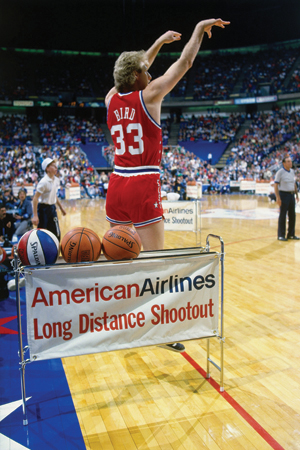 |
Larry Bird participates in the 1986 three-point contest.
Photo by: NBAE / Getty images |
1986
■ The American Airlines Long Distance Shootout three-point contest, won by the Boston Celtics’ Larry Bird, is added to All-Star weekend.
■ The NBA signs a two-year, $25 million deal with TBS.
1987
■ The league grants expansion franchises to Charlotte, Miami, Minneapolis and Orlando. The Hornets and Heat will join the league in 1988-89 and the Timberwolves and Magic in 1989-90. Each franchise will pay an entry fee of $32.5 million.
■ The opening game of the McDonald’s Open international competition, sponsored by the NBA and FIBA, is held in Milwaukee. The following year, the tournament is played in Madrid, Spain.
■ The NBA and Turner agree to a two-year, $50 million extension.
1988
■ The Atlanta Hawks play an exhibition game against the Soviet Georgia All-Stars, becoming the first NBA team to play in the Soviet Union.
■ The league and players union agree to test all rookies for drug use during training camps.
1989
■ The NBA draft is broadcast live for the first time, with TBS providing the coverage.
■ The NBA joins USA Basketball after FIBA modifies its rules to allow professional basketball players to participate in international competitions.
■ The league signs a four-year, $600 million contract with NBC and announces a four-year, $275 million renewal with TNT.
1990
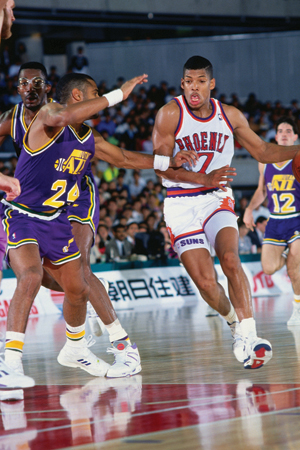 |
Kevin Johnson dribbles down the lane during the 1990 regular-season game in Tokyo.
Photo by: NBAE / Getty Images |
■ In Tokyo, the Phoenix Suns and Utah Jazz play the first regular-season game held outside of North America for any major American sport.
1991
■ Magic Johnson retires after disclosing that he has tested positive for HIV. Johnson will return for a comeback with the Los Angeles Lakers during the 1995-96 season.
1992
■ The U.S. Olympic “Dream Team” features NBA stars for the first time and wins the gold medal in Barcelona.
■ The Houston Rockets and Dallas Mavericks play the first NBA game in Latin America in a preseason matchup in Mexico City.
1993
■ NBC signs a four-year extension of its contract for $750 million; Turner Sports agrees to a four-year extension of its cable TV contract, worth more than $350 million.
■ In the first preseason game played in Europe, the Orlando Magic defeat the Atlanta Hawks at London’s Wembley Arena.
■ The NBA board of governors grants the league’s 28th franchise to a Toronto group led by John Bitove Jr. The Raptors will begin play in the 1995-96 season.
1994
■ The Schick Rookie Game replaces the Schick Legends Game during All-Star weekend.
■ The league grants a franchise to a Vancouver group headed by NHL Canucks owner Arthur Griffiths.
■ NBA All-Star balloting is extended beyond the United States for the first time. Ballots are available at Foot Locker stores in Mexico, Puerto Rico, Canada and Australia.
■ DirecTV announces a deal to carry more than 400 regular-season games to customers who subscribe to NBA League Pass.
1995
■ The NBA faces its first lockout, but players vote to accept a new agreement before any games are lost.
■ NBA.com launches through a partnership with Starwave and ESPN.
■ The NBA and its referees sign a five-year labor deal, ending a lockout of the officials.
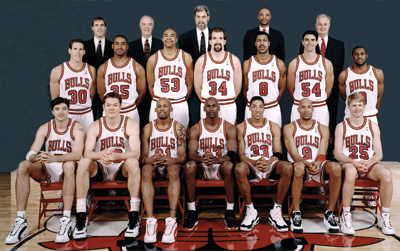 |
The record-setting Chicago Bulls team of 1996
Photo by: NBAE / Getty Images |
1996
■ The Chicago Bulls finish the regular season with a 72-10 record, setting a record for most victories in a season.
■ The NBA board of governors reveals the creation of the WNBA, to begin play in 1997.
■ After a lockout that lasts only a couple of hours, the league announces a new collective-bargaining agreement through the 2000-01 season.
■ Stern announces the 50 Greatest Players to honor the 50th anniversary of the founding of the league.
1997
■ The league announces new four-year deals with NBC and Turner worth more than $2.6 billion.
■ The Dallas Mavericks and Houston Rockets play the NBA’s first regular-season game in Mexico.
1998
■ The 1997-98 season ends with the highest-rated NBA Finals in history. The six NBC broadcasts between the Bulls and Jazz average an 18.7 rating.
■ The NBA cancels the first two weeks of the 1998-99 season because of stalled labor talks.
1999
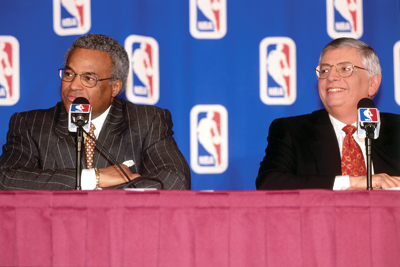 |
The NBPA’s Billy Hunter and Stern announce the labor deal.
Photo by: NBAE / Getty Images |
■ The NBA and its players sign a six-year collective-bargaining agreement, ending the first regular-season work stoppage in NBA history.
■ The NBA becomes the first league to launch its own network, NBA.com TV (now NBA TV).
■ The NBA and Hard Rock Cafe break ground at Universal Studios Escape in Orlando on NBA City, the first NBA-themed restaurant.
■ NBA.com offers free Japanese-language audio broadcasts for the first time for the NBA Japan Games.
2000
■ NBA.com launches NBA.com/UK, an online section for basketball fans in the United Kingdom.
■ The league announces that a team representing the NBA’s new developmental league will compete in the 2000 Asian Basketball Association League against teams from China, Japan, Korea and Taiwan.
■ The league announces the forfeiture of Minnesota’s next five first-round draft picks, fines the team $3.5 million and voids all contracts between Joe Smith and the Timberwolves because of a secret agreement among Smith, his agent and the team in violation of the NBA’s salary cap rules. The league later restores Minnesota’s 2003 first-round draft pick.
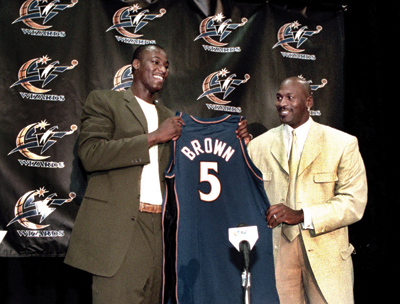 |
Kwame Brown, the first No. 1 pick straight out of high school, receives his Wizards jersey from Michael Jordan.
Photo by: Washington Post / Getty Images |
2001
■ Wang Zhizhi becomes the first China-born player to play in the NBA.
■ The Washington Wizards select Kwame Brown, making him the first No. 1 draft pick to be selected straight out of high school.
■ Basketball Without Borders begins. The project represents a joint effort between the NBA, the International Basketball Federation and the United Nations.
■ The NBA board of governors approves the move of the Grizzlies from Vancouver to Memphis starting with the
2001-02 season.
■ The NBA Development League (D-League) begins its first season of play.
2002
■ The NBA reaches six-year deals, totaling $4.6 billion, with ABC/ESPN and Turner to televise league games beginning with the 2002-03 season.
■ NBA owners approve the Hornets’ move from Charlotte to New Orleans beginning with the 2002-03 season.
■ A group led by BET founder Robert Johnson is awarded the expansion Charlotte franchise. Johnson will become the first African-American majority owner in U.S. major professional sports. The team will begin play in the 2004-05 season.
2003
■ The NBA and NBPA announce that the league will exercise its option to extend the collective-bargaining agreement through the 2004-05 season.
2004
■ NBA referees approve the league’s latest contract proposal.
■ A fight between players and fans during a Pistons-Pacers game at Detroit results in Stern handing out several suspensions, including the suspension of Indiana’s Ron Artest for the remainder of the season.
2005
 |
Players show off their business casual attire in 2005.
Photo by: NBAE / Getty Images |
■ A new six-year labor agreement is reached that includes shorter contract lengths, a higher age limit for players entering the league, and a stricter drug-testing policy.
■ Hurricane Katrina causes extensive damage to New Orleans Arena, forcing the Hornets to seek a temporary venue. The Hornets relocate to Oklahoma City and play the majority of the 2005-06 and 2006-07 seasons there before returning to New Orleans in 2007.
■ The league launches the NBA Cares global outreach initiative.
■ A controversial dress code is introduced for players with a basic requirement of business casual attire whenever players are engaged in team or league business.
2006
■ Google signs a video download deal with the NBA. The new Google Video Store will feature full-length, downloadable videos of every NBA game for the season.
■ The NBA signs an 11-year exclusive merchandising partnership with Adidas beginning with the 2006-07 season.
■ The NBA states it will return to using a traditional leather game ball made by Spalding for the remainder of the 2006-07 season, beginning Jan. 1, after introducing a composite ball at the start of the season.
2007
■ The league finishes the 2006-07 regular season with the highest total attendance (17.8 million) and the highest average attendance (17,757) in NBA history.
■ The NBA announces eight-year media rights renewals with Turner and ESPN/ABC valued at
$930 million annually.
■ Former NBA referee Tim Donaghy pleads guilty to two felonies stemming from his involvement in advising professional gamblers on NBA games.
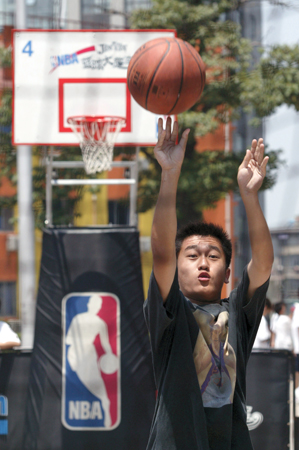 |
A fan competes in a shooting contest during the NBA Jam Van in China.
Photo by: Getty Images |
2008
■ The NBA announces the creation of NBA China, an entity that will conduct all of the league’s businesses in China.
■ Clay Bennett reaches a settlement in the lawsuit filed by the city of Seattle, completing the move of the Seattle SuperSonics to Oklahoma City. A group led by Bennett bought the team in 2006.
■ Stern says the league is laying off 9 percent of its work force over worries about the U.S. economy.
2009
■ The NBA confirms that beginning with the 2009-10 season the league will allow teams to sell ads on their practice jerseys.
■ The NBA declares a lockout of the league’s referees. Replacement referees are used in the preseason, but a new labor deal is reached before the regular season begins.
■ The New Jersey Nets announce the sale of a majority interest in the team to Russia-based investor Mikhail Prokhorov.
2010
■ The NBA signs a three-year sponsorship with Bacardi, making it the league’s first spirits partner.
■ During a live ESPN special, LeBron James announces he is leaving the Cleveland Cavaliers to join the Miami Heat.
■ The NBA opens a new office in Moscow.
2011
■ The CBA expires and forces the fourth lockout in NBA history. The lockout lasts 161 days, ending Dec. 8, 2011, when the owners and players ratify a new 10-year labor agreement.
■ Stern vetoes a three-team trade that involved sending Chris Paul to the Lakers, Lamar Odom and other players to the league-owned Hornets, and Pau Gasol to the Rockets.
2012
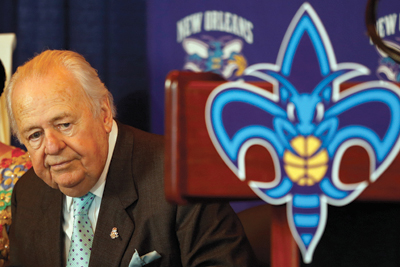 |
Saints owner Tom Benson goes for two in New Orleans.
Photo by: Getty Images |
■ Stern says he will recommend Deputy Commissioner Adam Silver to succeed him as commissioner.
■ The New Jersey Nets unveil their new team logos and color scheme. The Brooklyn Nets will begin playing at the new Barclays Center starting with the 2012–13 season.
■ Google agrees to pay the NBA a rights fee to stream 350 NBA D-League games live for the 2012-13 season.
■ New Orleans Saints owner Tom Benson buys the New Orleans Hornets from the NBA for $338 million. The league had acquired the team from founding owner George Shinn in December 2010.
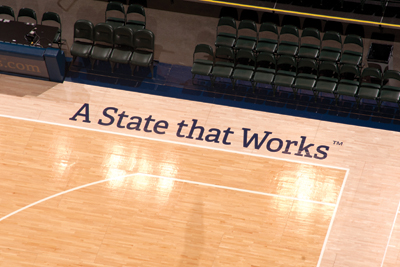 |
The Indiana Pacers get to work on new sponsor inventory.
Photo by: Indiana Pacers |
2013
■ The New Orleans Hornets announce that the team’s name will switch to the New Orleans Pelicans beginning with the 2013-14 season. The Charlotte Bobcats later announce that they will take over the Hornets name beginning with the 2014-15 season.
■ The NBA and SAP AG launch NBA.com/Stats, providing comprehensive league statistics.
■ A Sacramento-based group led by Vivek Ranadivé reaches a deal with the Maloof family to buy a controlling stake in the Sacramento Kings. The deal sets the team’s overall value at an NBA-record $535 million.
■ NBPA player reps vote unanimously to terminate the contract of Executive Director Billy Hunter.
■ The Indiana Pacers broker a deal with the Indiana Economic Development Corp., becoming the first NBA team to sell ads on the court.
2014
■ The NBA, four former ABA teams and former ABA Spirit of St. Louis co-owners Ozzie and Daniel Silna announce a conditional deal that will end the Silnas’ golden annuity and settle a lawsuit filed by the Silnas for additional compensation. The Silnas will receive an upfront payment of $500 million.
Source: SportsBusiness Journal research













